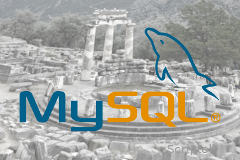Oracle vs PostgreSQL
Do I need to use Oracle or free software? Are the latter reliable?
There are several Oracle alternatives for managing important databases. Here we will compare with PostgreSQL. But Cassandra, which is used by Facebook and other social sites dealing in millions of deals a day, is another possibility.
PostgresSQL, which is also called postgres, comes from Ingres, hence the name post-gres. More efficient than MySQL (but harder to install), it is a completely free and fast growing product.
Who uses PostgreSQL?
Some notable companies are:
- Yahoo!. Uses a modified version of PostgreSQL for a database that in 2008 was considered the world's largest .
- MySpace. Social network.
- Hi5. Social network.
- Skype. Telephony site.
- Sony. For its online gaming platform.
- Afilias. Domain registration in .org and .info .
- International Space Station. Reliability!
High traffic sites use various Oracle alternatives.
- Google: BigTable - branded system.
- Facebook: Cassandra, an open source system coming out of BigTable.
- Youtube: BigTable .
- Yahoo!: PostgreSQL .
- Live (Microsoft). SQL Server.
- Wikipedia. MySQL.
- Twitter. MySQL and Cassandra .
In 2014, the NHS patient management service from the UK (80 million people) revised its infrastructure, abandoning Oracle in favor of Riak, a NoSQL solution. Riak is a key-value system. Savings are achieved in both software and hardware.
At the same time, Oregon in the US is suing Oracle because the patient care system they have introduced is a disaster.
Benchmark and comparison
PostgreSQL is considered equivalent in performance to Oracle. This or that is faster, depending on the functions, then the time spent on optimization.
| Function | Oracle | PostgreSLQ |
|---|---|---|
SQL |
x | x |
Reference integrity |
x | x |
Transaction |
x | x |
Unicode |
x | x |
Graphical interface |
x | x |
Maximum base size |
Unlimited | Unlimited |
Maximum table size |
4 GB | 32,000 GB |
Maximum column size |
8 Kb | 16,000 GB |
Maximum number of columns |
1000 | 250-1600 |
Maximum Blob Size |
Unlimited | 1 GB |
Maximum varchar size |
4 KB | 1 GB |
Number of bits for number |
128 bits | Unlimited |
Date: Farthest year |
9999 | 5874897 |
Column name length in pos. |
30 | 63 |
Different index types |
6/10 | 10/10 |
SQL capabilities |
11/11 | 10/11 |
Functions and Procedures |
x | x |
Partitioning methods |
4/6 | 4/6 |
Compatibility with conventional operating systems |
4/5 | 5/5 |
Typically, Oracle was very helpful in creating clusters and partitions. This was a difference from very large databases, with billions of lines. In 2017, Postgre acquired declarative partitioning, parallel queries (splitting the same query into parts that can run simultaneously), logical replication, and other features to simplify distribution across multiple nodes.
With a 17% increase in users compared to 2016, this is, in db-engines.com opinion, the most advanced tool of 2017 ahead of MongoDB.
Price
Oracle:
Prices are determined for the processor core. If the server uses a quad-core processor, the price should be quadrupled.
- Standard Edition: $17,500
- Enterprise Edition: $47,500 by heart
PostgreSQL:
- Free of charge.
Conclusion
PostgreSQL and Oracle are equivalent systems, although one is free and the other very expensive. Nothing justifies using Oracle over PostgreSQL, except for some categories of very large databases, and this was before version 10 of Postgre.
Many specialized companies offer their services for the installation, development, maintenance of DBMS, in both cases.
With the new features introduced in PostgreSQL version 9.3, many users believe that MongoDB is also losing interest, except when it is used with Node.js, and version 10 removes the disadvantages for Oracle..
Toolbox
- PostgreSQL. Download for free.
- phpPgAdmin Equivalent of phpMyAdmin (MySQL) for PostgreSQL.
- pgAdmin Local PostgreSQL database administrator.
- Ounce: Radics. RAD Access-like for databases including Postgre .
- PostGIS. For spatial or geographic data, this is better than an Oracle solution. Example: OpenStreetMap .
Documents
- Oracle, company.
- Web company databases.
Oracle vs PostgreSQL article
Lefthander
![]()
Hello, After discussing with a colleague the difference between Oracle and PostgreSQL, this one showed me this "page" regarding the comparison between the two databases .
I would already like to start my post by saying THANK YOU very much for the segment of the joke that this page provided me:) Let's take a closer look at this famous article. Let's get to the so-called list of companies that use Posgre. I'm not sure if this is true, but let's face it (let's still note the Sony case, given the action at the moment ^ ^). It looks like you are saying at this post that large boxes use Postgre, not Oracle. However, it should be said that almost all major banks/insurance companies in the world are on Oracle. We can add people from SNCF, mail... Oracle's list of large customers is long...
As for licenses, it should be remembered that there is a free version of Oracle (express edition), and since 1 year Oracle has owned Mysql. Now there is an attack on the LOL part of the article: comparative. The lady learns to read English, and you will see that the powerpoint conclusions in the link are that Oracle is the fastest, and Postgre is slow and generates network traffic ...
But it was not bad:) We continue with the picture. Lots of fake stuff. I'm not going to make a complete list out of it. I don't know Postgr at all, so I wouldn't say anything about this column, but anyway for the Oracle part most of it is false... (maximum table size, maximum column size, distant year...) The imprisonment eventually completed me... Reading that Postgre and Oracle were "equivalent systems" made my entire office laugh! "Nothing justifies the work of Oracle, not PostgreSQL" -> it's strange that so many boxes use Oracle, so if we have such a good free database nearby... It is easy to make completely subjective articles with so-called numbers or comparative tables coming out of nowhere! And the worst thing is that after that it serves as a reference to the people who get to this page... So yes, use PostgreSQL, not Oracle for a website database, I completely agree, because at the management level of small and medium databases, DBMSs are at the same level, but it's good when we start moving to big basics, I'm not sure that there is a lot of database left in Postgre...
Webmaster
![]()
Hello All reviews are welcome, even if they are critical and sometimes on the verge of decency. Let's take a look at a few important points...
"You seem to be saying in this post that the big boxes are using Postgre, not Oracle."Not really. I give a list of important sites that made this choice to prove that it works in production.
I know very well that most large companies will prefer Oracle or any commercial software, primarily due to lack of information. And then he will force customers to pay, so why deprive yourself.
As for the picture, I myself have not completed it, we doubt it comes from secure sources, but this is information that is constantly changing with each new software version. It will only be accurate at some point.
I am not a PostgreSQL fanatic, I just want to state this and remind you that there are free solutions for those who want to use them.
I also appreciate, if not more, SGDB such as Cassandra and the NoSQL principle (by which is meant an extension in both columns and rows). Or ArangoDB or MongoDB.

